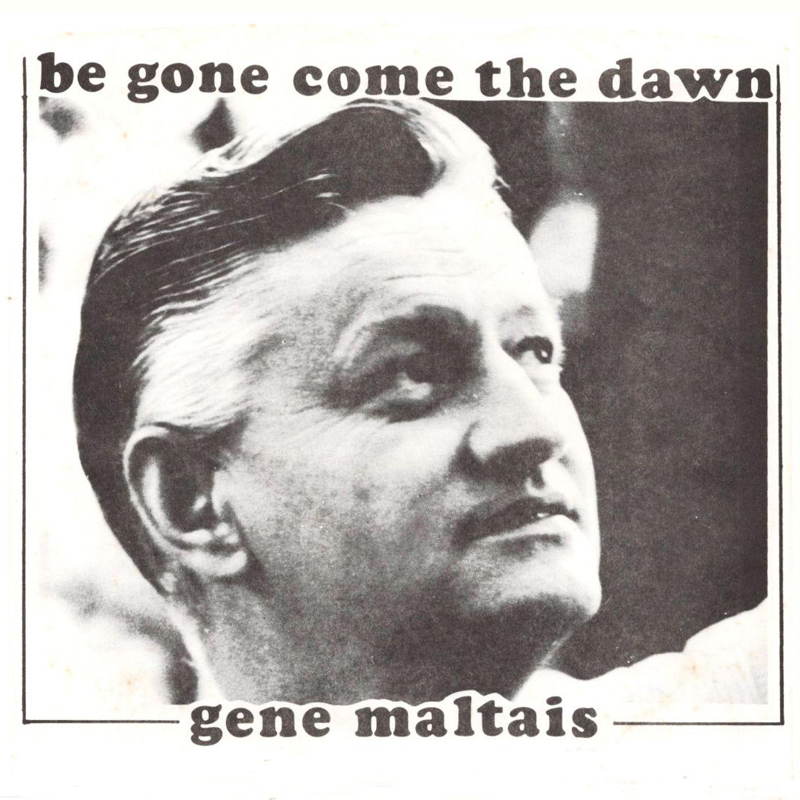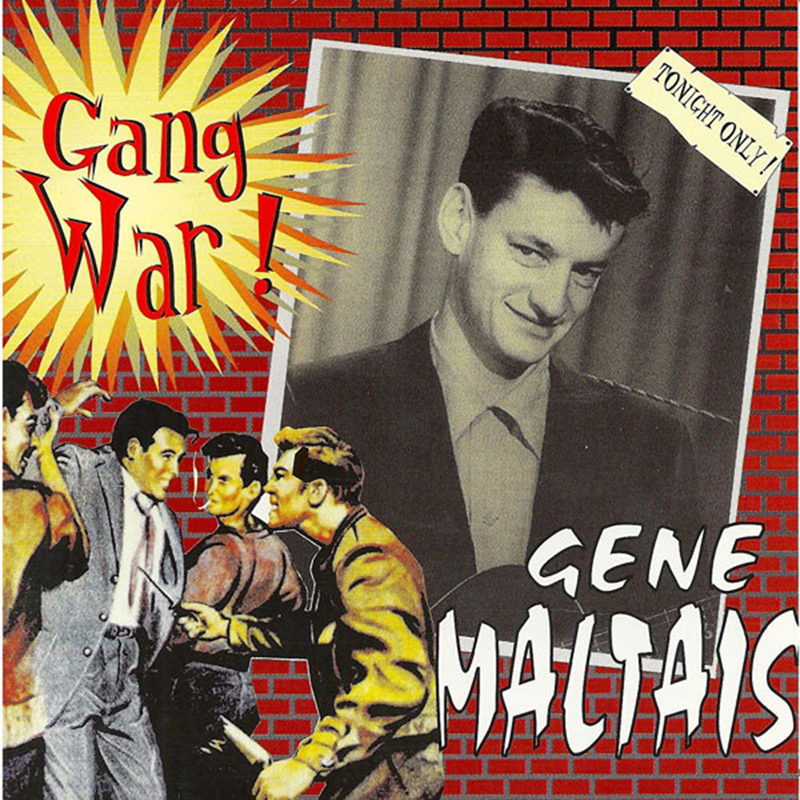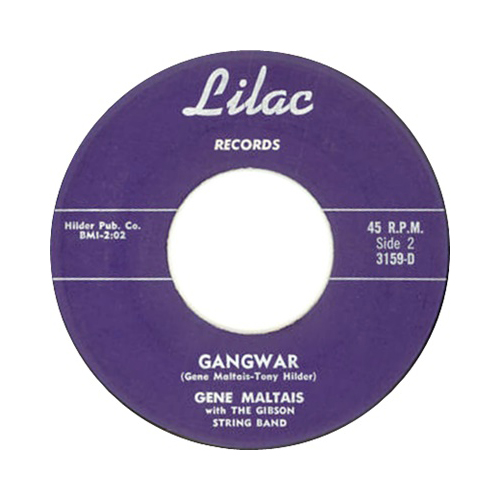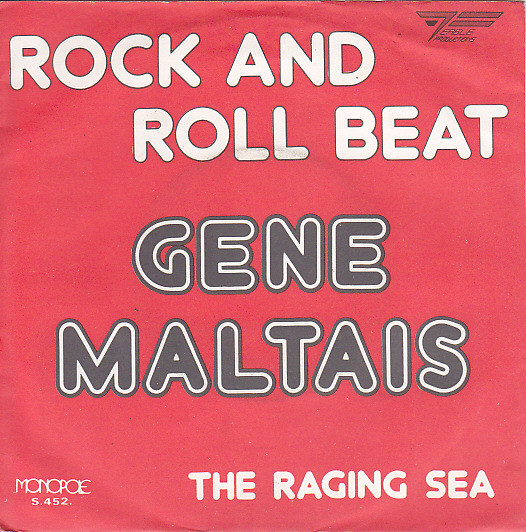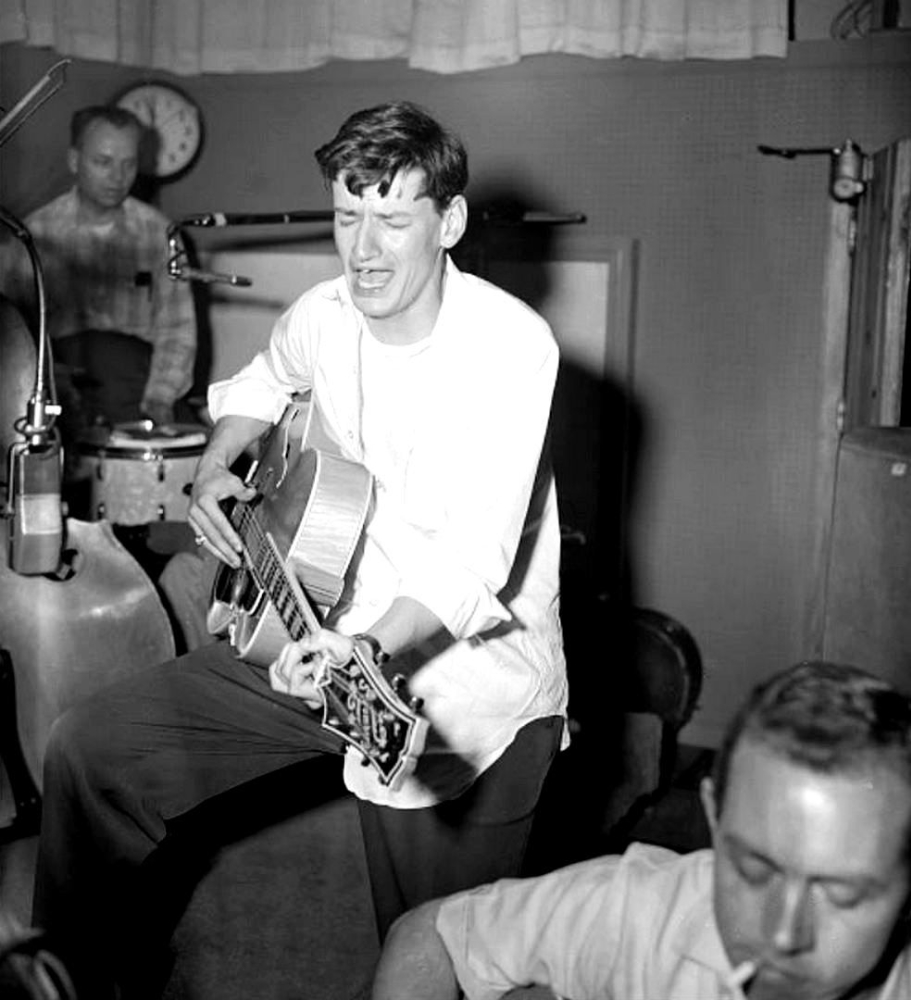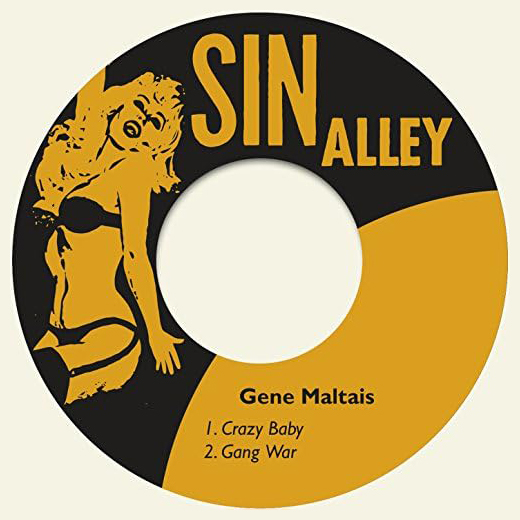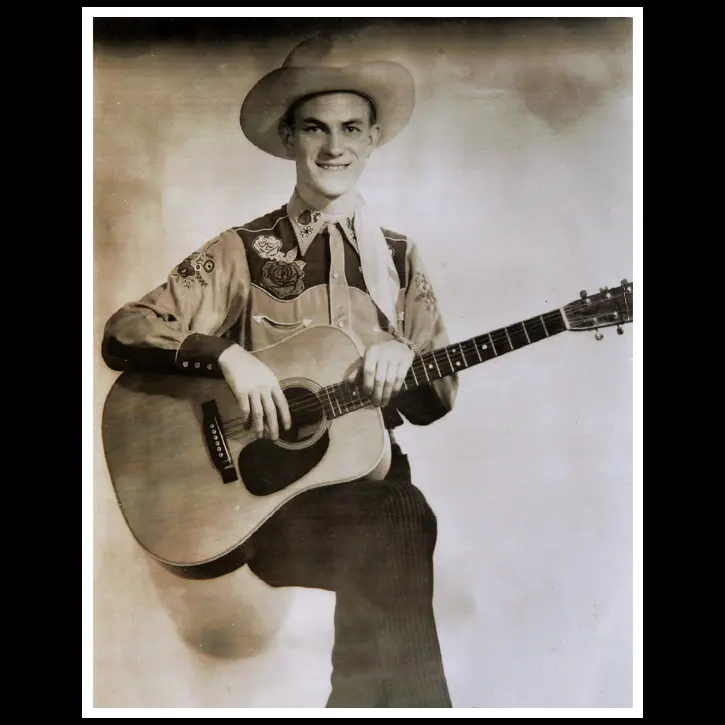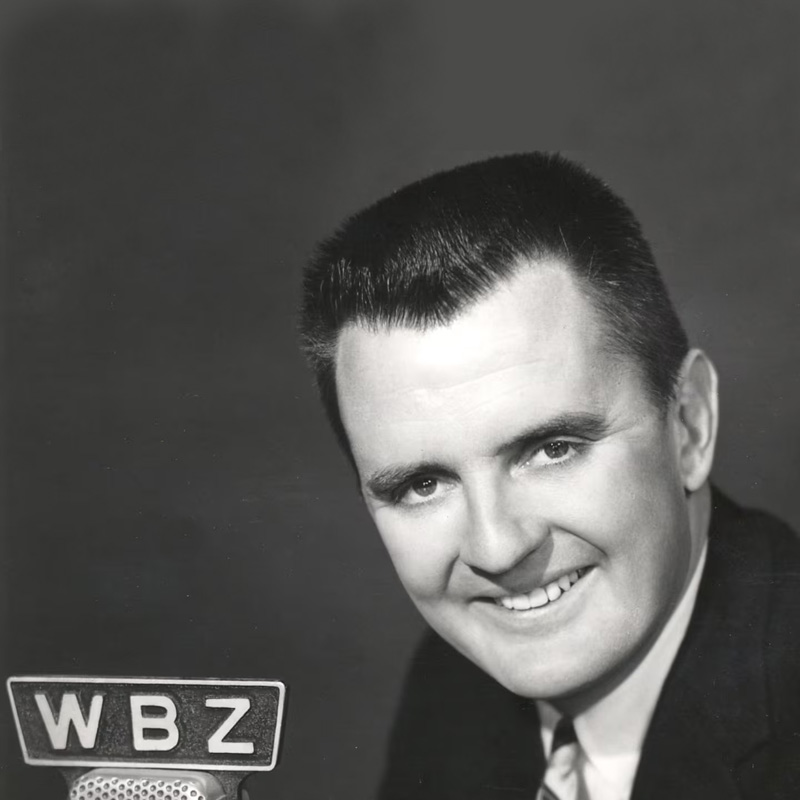Gene Maltais
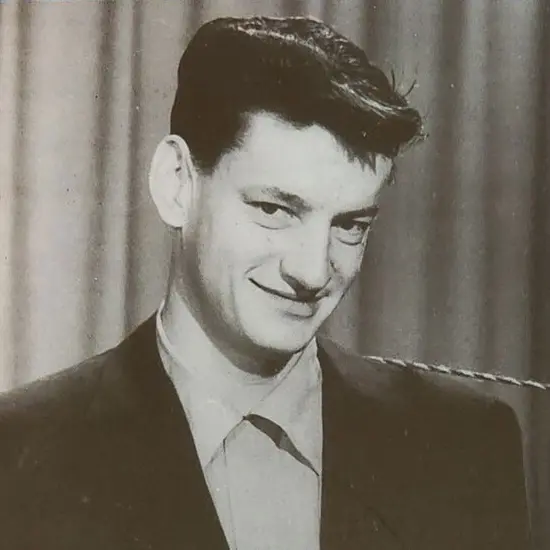
Born at the height of the Great Depression, rockabilly pioneer Gene Maltais was a major presence on the New England scene as rock ‘n’ roll blossomed during the Eisenhower Era, earning the nickname “Mad Man” Maltais for the bottomless energy he displayed on stage and in the studio. Though he never achieved the national recognition of Maine native Bill Flagg, who’s credited with coining the word “rockbilly” (which morphed into “rockabilly”), he cut several singles that became classics of the genre, demonstrated relentless ambition and is considered to be New Hampshire’s first bona fide rock star.
MUSICAL BEGINNINGS, EARLY CAREER
Born on May 21, 1933 in Concord, New Hampshire, Maltais started playing guitar in his early teens and performed at various local venues during his final two years of high school, including a regular gig at a restaurant on weekdays and weekends. After graduating, he spent about a year traveling across the United States, during which time he did odd jobs including one as a bellhop at the Challenger Inn in Sun Valley, Idaho, which was a popular spot for Hollywood stars taking a break from Tinsel Town. He also worked as a bellhop in Wyoming and as a chauffeur in Arizona.
Upon returning to the Granite State in 1952, 19-year-old Maltais continued to hone his singing and guitar-playing skills at area venues and he started writing original material, determined to establish a recording career. He spent the next several years gigging around New England, becoming one of the most popular acts on the regional circuit, but by early 1957 had become so frustrated by the empty promises local promoters made to land him a major-label deal that he hitchhiked nearly 1,200 miles south to Nashville in order to approach labels himself, without a manager or other representative. While it was often difficult to get past receptionists, he managed to land meetings at Capitol, Columbia and Mercury, though none resulted in a recording contract.
CHET ATKINS, DECCA RECORDS, “CRAZY BABY”
Maltais’ fortunes brightened in the early spring of 1957, however, when, as luck or fate would have it, he crossed paths with Chet Atkins while walking down a Nashville street; he’d recognized the country superstar from a popular guitar advertisement of the day and seized the moment to explain the trouble he was having at breaking into the music business on a national scale. Atkins, who’d recorded six albums for RCA Victor by the time he met Maltais, said he might have a better chance with Decca since the label’s Nashville branch focused more on rockabilly than other labels in Music City did.
Maltais took the advice and went to the Decca offices the next day by himself without an appointment, dropping Atkins’ name upon arrival at the front desk. That helped convince a secretary to listen to him sing his new song “Crazy Baby” in the lobby and, as luck or fate would have it, Decca recording artist Webb Pierce, a wildly popular honky-tonk singer-songwriter-guitarist at the time, was walking by as he was singing. Impressed by the song and Maltais’ impassioned delivery, he invited Maltais into his office and had him record four takes of the tune into a portable tape recorder; immediately after that, he called Decca President Paul Cohen in New York City about their possible new rockabilly star.
Cohen agreed to fly to Nashville two days later and Decca gave Maltais $50 (about $560 in 2024) to stay at the city’s Andrew Jackson Hotel until then; Maltais stayed at the YMCA for free instead, pocketing the then-impressive amount of cash. Upon arriving at Decca’s Nashville’s office, Cohen listened to the tapes Pierce had made of Maltais singing “Crazy Baby” and signed him, booking a session for the next day, April 19, 1957. “I like the tape,” he told Maltais, according to a 1975 piece in Rockville magazine written by Jack Warner. “You’re going to be a star!” They cut “Crazy Baby” b/w “Deep River Blues” at Owen Bradley’s Barn, a full-service studio used by many of the top labels, with session cats including guitarist Hank Garland and pianist Owen Bradley and The Anita Kerr Singers doing backup vocals.
Decca released the single about six months later but neither song made a dent in the national charts and the label sent Maltais packing instead of proceeding with additional sessions. According to Warner in the Rockville piece, Maltais’ steadfast insistence on representing himself might have contributed to the lack of commercial success. “The fact that Gene never signed a management contract may have hurt the record’s chances,” he wrote.
“GANG WAR,” “THE RAGING SEA,” “LOVEMAKIN’,” “BUG”
Maltais returned to New Hampshire after the April sessions in Nashville and, now promoted as “Decca recording artist Gene Maltais,” became a significant draw across New England and the greater Northeast. When the Decca tracks flopped in the fall of ’57 and Decca cut him from their roster, however, he left the region once again to pursue his musical dreams, this time driving his 1949 Chevy some 2,900 miles west to Los Angeles, which was well on its way to becoming the recording mecca that it is today.
Using the cold-calling skills he’d developed in Nashville, he knocked on the doors of several record companies upon arrival, one of which was Aladdin (on the recommendation of Modern Records A&R man and well-known surf-music producer Tony Hilder). Though the label didn’t offer Maltais a contract, they had their artists Johnnie & Jackie cut two of his songs, “Gang War” and “The Raging Sea.” In the late fall of 1957, after discussions with producer Robert “Bumps” Blackwell (Little Richard, Sam Cooke) and Dot Records’ Milt Rogers failed to result in further sessions and a label deal, Maltais felt that he’d exhausted his options in LA and returned to New Hampshire.
While driving back, his car broke down in Euclid, Oklahoma and, after selling it for scrap for $5 (about $56 in 2024), he hitchhiked the rest of the way, getting into a vicious fight outside a bar in Mississippi that left him with knife scars for the rest of this life. After arriving in New Hampshire, he put his musical goals aside for about two months in order to rebuild his bank account, working for the state doing microfilming and saving enough to buy a new car. In November 1957, 24-year-old Maltais used his new wheels to leave New England for the fourth time in his life, heading back to LA to make yet another effort to turn his rock ‘n’ roll fantasy into reality.
While there, he heard about a newly opened Phoenix-based label called Regal Records that was looking for talent; he landed an audition easily after he told them about his Decca single and in December Regal recorded two Maltais originals, “Lovemakin’” b/w “Bug,” with studio musicians that included future hit-maker Duane Eddy on guitar. Like “Crazy Baby” and “Deep River Blues” just a few months before, however, neither song cracked nationally and Maltais returned to New Hampshire yet again, unsigned and as exasperated with hard truths of the music business as ever. After performing on the local circuit for about a year, during which time he continued acting as his own manager and opened for a number of major acts including Conway Twitty, he recorded his own renditions of “Gang War” and “The Raging Sea” with The Gibson String Band, releasing them as a single on his own label, Lilac Records, in 1959. He pressed fewer than 1,000 copies, which made the disc the a hot item among collectors until the early ‘70s, when the Massabesic label reissued both tracks.
LATER CAREER, CURRENT ACTIVITY
In addition to performing live around New England during the late ‘50s and into the early ’60, Maltais made appearances on a number of TV programs, including Dave Maynard’s Record Shop Hop in Boston (with chart-topping pop singer Connie Francis) and he hosted The Gene Maltais Variety Show on local TV in New Hampshire. Aside from one demo session in 1965, he stayed out of the studio until 1975, when he cut “Rock and Roll Beat” b/w “The Raging Sea” in Belgium with producer Mac Bouvrie; Monopole issued the single in 1977 and in 2020 “Rock and Roll Beat” was included on the soundtrack for the film Never, Rarely, Sometimes, Always. Also in 1977, New England Records released “Rock and Roll Beat” b/w “Be Gone Come the Dawn,” another Maltais original.
Through the ‘70s, ‘80s and ‘90s, Maltais ran his own business, got involved in New Hampshire politics, did a notable amount of charity work and performed semi-regularly at small venues and festivals in New England. He made his most recent studio outing in 1994, at age 61, recording “Voodoo Woman” b/w “Little Girl” for New York City-based Norton Records. He’s done a number of demo sessions over the past two decades and in 2003, recognizing the demand for previously unreleased Maltais material, German label Hydra released a 20-track compilation of his studio material, Gang War. Norton re-released “The Raging Sea” and “Gang War” as a single in 2012.
Maltais, now 91 and living in New Hampshire, made live appearances into his 80s, including one in September 2015 in Sturbridge, Massachusetts at the New England Shake-Up, which also featured Mark Gamjager & His Lustre Kings, The Outta Sites, Roy Rapid & The Rhythm Rock Trio, Johnny Carlevalo & The Rollin’ Pins, The Bellfuries, The Millwinders and Big Sandy & Hit Fly-Rite Boys, among others. Maltais performed “The Raging Sea” for the roughly 800-strong crowd, which included three generations of rock ‘n’ rollers.
(by D.S. Monahan with thanks to Jack Warner and Kevin Patey)

